You know, I’m no stranger to depressing material, but Leaving Las Vegas is emotionally brutal, a masterpiece perhaps but absolutely devastating. It accepts that these two people will not wind up together and Nicolas Cage’s alcoholic writer will more than likely drink himself to death, and proceeds from there. When your central romantic triangle is a drunken writer, a prostitute and enough booze to fill the Pacific Ocean, we are not in uplifting territory here.
What I appreciated the most about Leaving Las Vegas was that it didn’t condemn or pander to its two central characters, rather it just took a step back and observed them in very minute and intimate detail. Writer/director/composer Mike Figgis pulls no punches in any of these respects. The moody and evocative score hammers home the point that these two needy, damaged people are only going to have the briefest piece of happiness together, they’re doomed, there is no escape here. And a scene early in their romance (if that’s even the correct wording for it) details this point explicitly. He will not ask her to stop being a hooker, she will not ask him to stop drinking, and they begrudgingly agree to this strange compromise.
It pull this moment into a wider focus, it feeds into the film’s larger scope of a hard look at dependency. Not only is she dependent on being a hooker for whatever strange reason, but she’s dependent on the drama he creates in her life, and that he’s a bigger mess than she is. He knows he’ll need a handler for his eventual drunken stupors and outbursts, and they do have a strangely sympathetic and empathetic connection to each other, so why not go along for this ride before he eventual kills himself with drink. They depend on the stability the other brings so that they can engage in their reckless behavior without fear of judgment. Their dependency exceeds beyond their obvious vices and soon becomes each other.
None of this would have been remotely watchable without the blistering work from Cage and Elisabeth Shue in the central roles. It’s easy to forget just how great an actor Cage can be nowadays since he’s devolved into National Treasure and campy work in films like Seasons of the Witch. There is none of that here, Cage is best in roles that allow him to be neurotic and twitchy, he can never be a normal person. Las Vegas gives him a role that he can fill in with his tics and odd bits of business, but Cage lets us forget that there is a human being slowly decaying before us. And Shue has never shown more depth of feeling or range as she has here. It’s one hell of a take on the hooker with a heart of gold trope, never really cracking entirely outside of cynicism or world-weariness that the character lives with day-to-day, but desperately trying to find a bit of happiness in her bleak life. It’s a shame that Shue can’t seem to find another film role as rich as this one and seems to have disappeared once more.
Leaving Las Vegas does possess a ragged charm, like its two central characters, but it’s tough stuff. It’s darkly charismatic, that’s probably the best description of it that I can summon up. It’s worth watching for certain, but don’t come to it expecting the typical Hollywood uplift and happy ending. There is no balm for any wounds here, just a good hard, unflinching look at dependency and a severely deranged romantic coupling.
Leaving Las Vegas
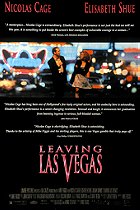 Posted : 11 years, 7 months ago on 12 November 2013 09:50
(A review of Leaving Las Vegas)
Posted : 11 years, 7 months ago on 12 November 2013 09:50
(A review of Leaving Las Vegas) 0 comments, Reply to this entry
0 comments, Reply to this entry
Good Will Hunting
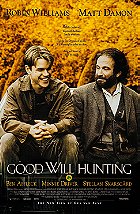 Posted : 11 years, 7 months ago on 12 November 2013 09:50
(A review of Good Will Hunting)
Posted : 11 years, 7 months ago on 12 November 2013 09:50
(A review of Good Will Hunting)No disrespect is intended to the perfectly fine script that Matt Damon and Ben Affleck cooked up, but I think the real Best Original Screenplay Oscar should have went to Boogie Nights. But let’s focus in on Good Will Hunting. The script is great in building intimate, character-driven moments that play off believably and beautifully, and it effectively evokes the language and atmosphere of South Boston, but it paints in too broad of strokes that signal exactly where the characters journeys are going to wind up by the time we fade to black. Still, it’s not a grave injustice, and it’s not hard to see why the Academy was won over by the film.
But the real joy in Good Will Hunting is the assured, committed and heartfelt performances in the four lead roles. Matt Damon proved himself to be quite a talented actor, and his resume keeps expanding with a nice combination of movie star turns and more challenging material. Minnie Driver has rarely had quite so engaging a performance as she does here. She’s by turns tough, brainy, sexy and utterly charming, a beacon of light and hope for Damon’s character amongst the poverty and overnights in jail. Ben Affleck is a little hit-and-miss, but there’s a monolog late in the film in which he details his hopes for Damon that is pretty touching and extraordinary. You can sense a lifetime of friendship and a deep bond between these two without them ever truly making eye contact, and he then proceeds to dispense tough love and harsh words while making sure it is coming from a place of love and concern. Is Robin Williams the best performance in the film? Quite possibly, but it’s hard to say. He’s certainly fully immersed in the quiet pain of this man, and he sprinkles the role with tiny details here and there in his dialog that give the sense of a life fully lived and a spirit being entombed by his grief. His scenes with Damon are very touching for the fatherly way he takes to this boy, and how he breaks protocol yet continues to see him as a therapist in a way to help himself. It’s great work.
Sure the story is essayed from the moment all of the main players converge – he will eventually grow up and mature, he will go and get the girl, everything will work out correctly in the end – but it doesn’t entirely matter. What makes Good Will Hunting so satisfying a movie is that it has a big heart, and it uses it to illuminate the healing of a damaged soul. That is surrounds itself with so authentic a portrait of South Boston and lets its characters speak in their natural rhythms and doesn’t try to force them into “movie character speak” is fantastic. It’s well-trod territory for certain, but there’s enough character, beauty in the specified vernacular and a wounded but beating heart at its center.
But the real joy in Good Will Hunting is the assured, committed and heartfelt performances in the four lead roles. Matt Damon proved himself to be quite a talented actor, and his resume keeps expanding with a nice combination of movie star turns and more challenging material. Minnie Driver has rarely had quite so engaging a performance as she does here. She’s by turns tough, brainy, sexy and utterly charming, a beacon of light and hope for Damon’s character amongst the poverty and overnights in jail. Ben Affleck is a little hit-and-miss, but there’s a monolog late in the film in which he details his hopes for Damon that is pretty touching and extraordinary. You can sense a lifetime of friendship and a deep bond between these two without them ever truly making eye contact, and he then proceeds to dispense tough love and harsh words while making sure it is coming from a place of love and concern. Is Robin Williams the best performance in the film? Quite possibly, but it’s hard to say. He’s certainly fully immersed in the quiet pain of this man, and he sprinkles the role with tiny details here and there in his dialog that give the sense of a life fully lived and a spirit being entombed by his grief. His scenes with Damon are very touching for the fatherly way he takes to this boy, and how he breaks protocol yet continues to see him as a therapist in a way to help himself. It’s great work.
Sure the story is essayed from the moment all of the main players converge – he will eventually grow up and mature, he will go and get the girl, everything will work out correctly in the end – but it doesn’t entirely matter. What makes Good Will Hunting so satisfying a movie is that it has a big heart, and it uses it to illuminate the healing of a damaged soul. That is surrounds itself with so authentic a portrait of South Boston and lets its characters speak in their natural rhythms and doesn’t try to force them into “movie character speak” is fantastic. It’s well-trod territory for certain, but there’s enough character, beauty in the specified vernacular and a wounded but beating heart at its center.
 0 comments, Reply to this entry
0 comments, Reply to this entry
Something's Gotta Give
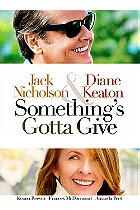 Posted : 11 years, 7 months ago on 12 November 2013 09:50
(A review of Something's Gotta Give)
Posted : 11 years, 7 months ago on 12 November 2013 09:50
(A review of Something's Gotta Give)I have a bit of a love/hate relationship with the work of Nancy Meyers. On the one hand, she’s a successful female director, writer and producer who gave great roles (in films of varying degrees of success) to Goldie Hawn (Private Benjamin), Whoopi Goldberg (Sister Act), Meryl Streep (It’s Complicated) and Diane Keaton, her most frequent collaborator. But she also tends towards toothless, overly sweet middle-class romantic comedies that hit all of the tropes of the genre without expanding their vocabulary much.
I understand that it’s radical enough to stick two middle-aged people in the center of your romantic storyline, and that’s great, sex and love don’t end when you hit thirty-five, but Something’s Gotta Give still hits every cliché as it shuffles on. It’s an enjoyable enough piece of fluff, but there’s something much better lurking beneath the surface. Look, you don’t cast actors with as much baggage and charisma as Jack Nicholson and Diane Keaton and not expect your audience to hope for a bit more fun, a bit more brains to go along with the story beats. Nicholson and Keaton have been cast here as variations on their media personas, but allowed to bring the real heart and expand the emotional inner life of those facades in brief moments that the film needed more of. I would’ve cut away with the extended sequence of Keaton crying and gone with more of the quiet character building moments.
Having said all of that, the film does have other problems (Frances McDormand, Jon Favreau and Amanda Peet are wasted in slightly written roles), but I still found myself laughing and enjoying the journey. It’s a bit too thin of a premise for two hours of running time, but I’d watch Nicholson and Keaton in just about anything and get even the tiniest of enjoyment out of it. I liked Something’s Gotta Give a lot more than that slim amount of praise. They’re both given pretty stellar roles (Keaton in particular plays the hell out of it), I just wish the rest of the film had risen to their level.
I understand that it’s radical enough to stick two middle-aged people in the center of your romantic storyline, and that’s great, sex and love don’t end when you hit thirty-five, but Something’s Gotta Give still hits every cliché as it shuffles on. It’s an enjoyable enough piece of fluff, but there’s something much better lurking beneath the surface. Look, you don’t cast actors with as much baggage and charisma as Jack Nicholson and Diane Keaton and not expect your audience to hope for a bit more fun, a bit more brains to go along with the story beats. Nicholson and Keaton have been cast here as variations on their media personas, but allowed to bring the real heart and expand the emotional inner life of those facades in brief moments that the film needed more of. I would’ve cut away with the extended sequence of Keaton crying and gone with more of the quiet character building moments.
Having said all of that, the film does have other problems (Frances McDormand, Jon Favreau and Amanda Peet are wasted in slightly written roles), but I still found myself laughing and enjoying the journey. It’s a bit too thin of a premise for two hours of running time, but I’d watch Nicholson and Keaton in just about anything and get even the tiniest of enjoyment out of it. I liked Something’s Gotta Give a lot more than that slim amount of praise. They’re both given pretty stellar roles (Keaton in particular plays the hell out of it), I just wish the rest of the film had risen to their level.
 0 comments, Reply to this entry
0 comments, Reply to this entry
Gravity
 Posted : 11 years, 7 months ago on 6 November 2013 10:16
(A review of Gravity)
Posted : 11 years, 7 months ago on 6 November 2013 10:16
(A review of Gravity)Before you say anything, yes, Gravity has problems with character development and occasional moments of terrible dialog, but that’s forgivable. You see, rarely does a movie demand itself to be seen in its full big screen 3D glory, and Gravity is one of those films. Once the theater lights darken and you’re left staring at vast emptiness of space it is both awe inspiring for the beauty, grandeur and then the feeling of insignificance begins to sink in.
Alfonso Cuaron had been working on this film for years, and it was one I always tried to read the latest news on. It sounded so daring, and I couldn’t help but wonder who would finally land the leads and how would they successfully accomplish the visuals? Advances in technology is the main answer to the second question, and the revolving door of actors to the first is proof that eventually the right person for the part will come around.
Now I know I’m generally known for not being the biggest fan or supporter of Sandra Bullock, but she impressed me here. That Oscar she won for that overrated Hallmark movie? Yeah, she deserves it for this one. While her character has several moments of thin writing, sheer star persona helps smooth those transitions. But she effectively makes the transition from damaged, introverted scientist to smart, tough survivor smooth. I’ve often said that Bullock seems adrift in her dramatic parts, her main skills are pratfalls and comedic mugging, but there’s something about the role and her persona that created a great marriage of actor and character. This is one of the few times that I found her emoting and dramatic work highly effective and very strong.
I’ve always enjoyed George Clooney, he’s a grand movie star and a great actor in his own right. Gravity gives him another variation of her star persona – a cocky professional who is good at his job and calm in a crisis – before giving him more depth and somber tones to play. Once more, problems with hammily written lines or holes in character motivations are polished off by casting a star who has played a variation of this role before, but still manages to bring a humanity to it.
And if Emmanuel Lubezki doesn’t finally win an Oscar for his masterful cinematography, I don’t want to live on this planet anymore. Not only are many of the shots incredibly long and tricky, but they’re happening in a purely digital place that must be matched later on with live action footage. No easy task in the slightest bit, but Lubezki delivers his typically strong, confident work that features so many stunningly beautiful images that the often talked about one of Bullock in a fetal position may not even be the best one, aesthetically. It is certainly the most emotionally arresting and deservedly famous.
Of course, I haven’t even begun to describe the plot of Gravity, but truly, the trailer gives most of it away. It’s a survival story in the desolation of space. If that isn’t frightening to you, I don’t know what else could be. There’s also a strong undercurrent of rebirth, of re-finding your inner self and core of strength. And perhaps Gravity is so effective at this because it throws us up into space in which communication, availability of food or water, basic things one needs in order to survive are in short supply. Yes, there is tremendous beauty to look down on earth from a god’s perspective. But I didn’t find God in the emptiness of space, I was just reminded of my own mortality.
Alfonso Cuaron had been working on this film for years, and it was one I always tried to read the latest news on. It sounded so daring, and I couldn’t help but wonder who would finally land the leads and how would they successfully accomplish the visuals? Advances in technology is the main answer to the second question, and the revolving door of actors to the first is proof that eventually the right person for the part will come around.
Now I know I’m generally known for not being the biggest fan or supporter of Sandra Bullock, but she impressed me here. That Oscar she won for that overrated Hallmark movie? Yeah, she deserves it for this one. While her character has several moments of thin writing, sheer star persona helps smooth those transitions. But she effectively makes the transition from damaged, introverted scientist to smart, tough survivor smooth. I’ve often said that Bullock seems adrift in her dramatic parts, her main skills are pratfalls and comedic mugging, but there’s something about the role and her persona that created a great marriage of actor and character. This is one of the few times that I found her emoting and dramatic work highly effective and very strong.
I’ve always enjoyed George Clooney, he’s a grand movie star and a great actor in his own right. Gravity gives him another variation of her star persona – a cocky professional who is good at his job and calm in a crisis – before giving him more depth and somber tones to play. Once more, problems with hammily written lines or holes in character motivations are polished off by casting a star who has played a variation of this role before, but still manages to bring a humanity to it.
And if Emmanuel Lubezki doesn’t finally win an Oscar for his masterful cinematography, I don’t want to live on this planet anymore. Not only are many of the shots incredibly long and tricky, but they’re happening in a purely digital place that must be matched later on with live action footage. No easy task in the slightest bit, but Lubezki delivers his typically strong, confident work that features so many stunningly beautiful images that the often talked about one of Bullock in a fetal position may not even be the best one, aesthetically. It is certainly the most emotionally arresting and deservedly famous.
Of course, I haven’t even begun to describe the plot of Gravity, but truly, the trailer gives most of it away. It’s a survival story in the desolation of space. If that isn’t frightening to you, I don’t know what else could be. There’s also a strong undercurrent of rebirth, of re-finding your inner self and core of strength. And perhaps Gravity is so effective at this because it throws us up into space in which communication, availability of food or water, basic things one needs in order to survive are in short supply. Yes, there is tremendous beauty to look down on earth from a god’s perspective. But I didn’t find God in the emptiness of space, I was just reminded of my own mortality.
 0 comments, Reply to this entry
0 comments, Reply to this entry
Stargate
 Posted : 11 years, 7 months ago on 6 November 2013 08:43
(A review of Stargate)
Posted : 11 years, 7 months ago on 6 November 2013 08:43
(A review of Stargate)Roland Emmerich has an ambitious eye for summertime movie eye candy. It’s a pity that he can’t seem to generate memorable characters or smart bits of dialog. Forget about good acting, his films are more concerned with taking these cardboard cutouts and blowing them from one set piece to another with all the subtly and brains of a leaf blower at four in the morning. Stargate is no different, but this time there’s actually a fun concept that would make for a great television show, pity that this is a movie.
Kurt Russell and James Spader try valiantly to emote and fill out their thinly plotted characters. Naturally, Russell is the all business, hardass solider and Spader does his weird, character actor-y nerd shtick. So thank god for Jaye Davidson as Ra, yes THAT Ra, giving a performance that is both alien and bitchiest, steeliest drag queen of all time. He’s clearly finding the camp and menace in this creation, giving good face and looking other worldly enough to sell the pitch-corrected voice that comes from. But his screen time is severely limited.
There’s a lot of cool ideas on display here, but none of it adds up to much of anything. It packs in too much exposition, and then leads to a meandering dead space in the middle before roaring back to life with the introduction of Ra in the final third. Emmerich puts his considerable budget on obvious display, but can’t seem to generate much interest in making the quiet moments work. It’s all too hollow as a film, but if it had been shortened to 45 minutes and shorn of much of the second and third act, it would make a great television series. So it isn’t hard to see why we eventually got Stargate SG-1 and the rest of the inevitable spinoffs. Highly encouraging and unique concept marred by elephantine execution: this movie or short-hand for Emmerich’s entire career? You decide.
Kurt Russell and James Spader try valiantly to emote and fill out their thinly plotted characters. Naturally, Russell is the all business, hardass solider and Spader does his weird, character actor-y nerd shtick. So thank god for Jaye Davidson as Ra, yes THAT Ra, giving a performance that is both alien and bitchiest, steeliest drag queen of all time. He’s clearly finding the camp and menace in this creation, giving good face and looking other worldly enough to sell the pitch-corrected voice that comes from. But his screen time is severely limited.
There’s a lot of cool ideas on display here, but none of it adds up to much of anything. It packs in too much exposition, and then leads to a meandering dead space in the middle before roaring back to life with the introduction of Ra in the final third. Emmerich puts his considerable budget on obvious display, but can’t seem to generate much interest in making the quiet moments work. It’s all too hollow as a film, but if it had been shortened to 45 minutes and shorn of much of the second and third act, it would make a great television series. So it isn’t hard to see why we eventually got Stargate SG-1 and the rest of the inevitable spinoffs. Highly encouraging and unique concept marred by elephantine execution: this movie or short-hand for Emmerich’s entire career? You decide.
 0 comments, Reply to this entry
0 comments, Reply to this entry
Bluebeard
 Posted : 11 years, 7 months ago on 6 November 2013 08:43
(A review of Bluebeard)
Posted : 11 years, 7 months ago on 6 November 2013 08:43
(A review of Bluebeard)I’m not entirely sure it’s a complete success, but my god is it an enchanting and mesmerizing journey through the sexual awakening of a young girl on the cusp of adulthood and a spin on fairy tales which remind us of their primordial power to shock, entice, awe and horrify us with equal measure. Catherine Breillat juxtaposes two different sets of sisters and Charles Perrault’s folktale as the framework to her version of Bluebeard.
And it seems no happy accident that the filmmaker behind a title like Fat Girl would take this fairy tale and spin it off into an exploration of female sexual fantasies. A young girl must wed, bed and tame a hulking and furry brute of a man? The essays practically write themselves for you. What pushes this young girl to agree to marry this animalistic man? Well, marriage or poverty is one example. Or deep-seated abandonment from her father is another. Or perhaps it’s the vow she had made earlier in the film to enact revenge upon the cruel Catholic nuns who kicked and her sister out of school by living in a castle and becoming a lady of wealth and power. There are many different symbols that can be read upon their union, and each of them has enough material in the film to make that reading seem fair and accurate.
This atmosphere is sustained through the castle’s set. This castle seems to be as much as symbolic psychosexual hothouse of repressed desires and violence as Laurence Olivier’s Hamlet. Corridors twist and turn, they lead to other corridors which finally lead to tiny bedrooms which allow for our young heroine to remain a chaste virgin and not make the transition into grown womanhood. There also seems to be a switch in power, a constant change between Bluebeard and his young wife being in charge of the other. At times she tames the beast through her virginal sweetness, and at others she demurs to his brute shows of force and aggression.
What kept me from completely enjoying the film was the cutting back to the other story. This one sees two very young sisters sneaking off to the attic to tell the story of Bluebeard and try to scare each other. This device isn’t entirely successful because these girls are VERY young. While the sisters in the main story are in their teens, so it makes sense for them to be confused and worried about darker material like “the blood” or consummating a marriage, these two are nowhere near adolescent age and couldn’t possibly have any knowledge or emotional grasp on these concepts. It doesn’t completely sink the film, but it does mar it. The shock ending is something I’m still not sure about. It’s certainly successful at hammering home the point that these tales were filled with violence and scary thematic material, but it might be too brutish an ending for a film that is mostly dream-like and hypnotic.
And it seems no happy accident that the filmmaker behind a title like Fat Girl would take this fairy tale and spin it off into an exploration of female sexual fantasies. A young girl must wed, bed and tame a hulking and furry brute of a man? The essays practically write themselves for you. What pushes this young girl to agree to marry this animalistic man? Well, marriage or poverty is one example. Or deep-seated abandonment from her father is another. Or perhaps it’s the vow she had made earlier in the film to enact revenge upon the cruel Catholic nuns who kicked and her sister out of school by living in a castle and becoming a lady of wealth and power. There are many different symbols that can be read upon their union, and each of them has enough material in the film to make that reading seem fair and accurate.
This atmosphere is sustained through the castle’s set. This castle seems to be as much as symbolic psychosexual hothouse of repressed desires and violence as Laurence Olivier’s Hamlet. Corridors twist and turn, they lead to other corridors which finally lead to tiny bedrooms which allow for our young heroine to remain a chaste virgin and not make the transition into grown womanhood. There also seems to be a switch in power, a constant change between Bluebeard and his young wife being in charge of the other. At times she tames the beast through her virginal sweetness, and at others she demurs to his brute shows of force and aggression.
What kept me from completely enjoying the film was the cutting back to the other story. This one sees two very young sisters sneaking off to the attic to tell the story of Bluebeard and try to scare each other. This device isn’t entirely successful because these girls are VERY young. While the sisters in the main story are in their teens, so it makes sense for them to be confused and worried about darker material like “the blood” or consummating a marriage, these two are nowhere near adolescent age and couldn’t possibly have any knowledge or emotional grasp on these concepts. It doesn’t completely sink the film, but it does mar it. The shock ending is something I’m still not sure about. It’s certainly successful at hammering home the point that these tales were filled with violence and scary thematic material, but it might be too brutish an ending for a film that is mostly dream-like and hypnotic.
 0 comments, Reply to this entry
0 comments, Reply to this entry
Scrooged
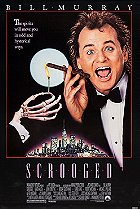 Posted : 11 years, 7 months ago on 6 November 2013 08:43
(A review of Scrooged)
Posted : 11 years, 7 months ago on 6 November 2013 08:43
(A review of Scrooged)Bill Murray essaying Scrooge as a bottom-line network executive in a satirical take on A Christmas Carol sounds like a great idea on paper. In practice, well, it couldn’t decide how dark and weird or uplifting and generically funny it wants to be. Somewhere within Scrooged is a much better movie, but either way, Murray delivers a great performance.
Where Richard Donner went right in making this was in the casting. Sure, Karen Allen and Alfre Woodard are wasted in thankless and underwritten roles, but they do their best with the material as it is written. Doing much better work are the three ghosts that we meet: John Forsythe, Carol Kane and David Johansen (one of the ghosts is an impressive combination of makeup and puppetry). Kane in particular seems to be having a deliriously fun time and is, quite possibly, the comedic highlight of the film. But the film belongs to Murray’s patented insouciance and adds to it a surliness and cutthroat demeanor that would make even Gordon Gekko blush.
But Scrooged can’t decide how funny or dark it wants to be and switches back and forth between them constantly. It’s irreverent, for certain, and why not? Dickens’ story has been told so often that it deserves to have the piss taken out of it. But the jokes and setups need to pay off in a comedic way, not in a way that feels more bitter and angry than anything else. If nothing else, Scrooged can feel like an SNL sketch that’s been stretched, stuffed and padded to fill out the running time for a feature length film. But there’s a smart idea, a game cast, some nice makeup and special effects work, it’s a pity that the script kills what chances the film had as it was already halfway decent.
Where Richard Donner went right in making this was in the casting. Sure, Karen Allen and Alfre Woodard are wasted in thankless and underwritten roles, but they do their best with the material as it is written. Doing much better work are the three ghosts that we meet: John Forsythe, Carol Kane and David Johansen (one of the ghosts is an impressive combination of makeup and puppetry). Kane in particular seems to be having a deliriously fun time and is, quite possibly, the comedic highlight of the film. But the film belongs to Murray’s patented insouciance and adds to it a surliness and cutthroat demeanor that would make even Gordon Gekko blush.
But Scrooged can’t decide how funny or dark it wants to be and switches back and forth between them constantly. It’s irreverent, for certain, and why not? Dickens’ story has been told so often that it deserves to have the piss taken out of it. But the jokes and setups need to pay off in a comedic way, not in a way that feels more bitter and angry than anything else. If nothing else, Scrooged can feel like an SNL sketch that’s been stretched, stuffed and padded to fill out the running time for a feature length film. But there’s a smart idea, a game cast, some nice makeup and special effects work, it’s a pity that the script kills what chances the film had as it was already halfway decent.
 0 comments, Reply to this entry
0 comments, Reply to this entry
Ghost
 Posted : 11 years, 7 months ago on 6 November 2013 08:43
(A review of Ghost)
Posted : 11 years, 7 months ago on 6 November 2013 08:43
(A review of Ghost)What the hell is this movie and how did it get nominated for the following Oscars: Picture, Director and Screenplay? It’s not just that Ghost has a severe identity crisis as a film, which it does, but it just isn’t very good. It’s pure Hallmark-style wish fulfillment with a hollow emotional core. I always think that it’s a good idea to ignore films that try to offer something for everyone, and Ghost tries to have it every which way that it can. There’s the central romance, the heaven-can-wait fantasy, the corporate intrigue and darker murder mystery elements. They never successfully come together, instead causing the film to zip wildly and unevenly between moments of almost farcical comedy and mawkish melodrama.
Maybe if the romantic chemistry between Demi Moore and Patrick Swayze had existed it would’ve fixed most of these problems, or if more time had been spent making us care or invest in their relationship. Instead, Moore spends much of her time staring off into the void and doing variations of the pretty-cry. Tony Goldwyn is also largely wasted in a supporting role that switches gears so quickly I’m surprised you can’t actually hear a loud noise detailing how rough it is. So what we’re left with is a great movie star turn from Swayze, who earnestly believes in every minute and change in his character’s journey, and some great scene-stealing work from Whoopi Goldberg. It’s not hard to see why she won the Oscar that year. The role feels tailored made to highlight her gifts as both a dramatic and comedic actor. Her back-and-forth with Swayze was also wildly entertaining, giving a fairly dull and sleepy film a large dose of energy.
Maybe if the romantic chemistry between Demi Moore and Patrick Swayze had existed it would’ve fixed most of these problems, or if more time had been spent making us care or invest in their relationship. Instead, Moore spends much of her time staring off into the void and doing variations of the pretty-cry. Tony Goldwyn is also largely wasted in a supporting role that switches gears so quickly I’m surprised you can’t actually hear a loud noise detailing how rough it is. So what we’re left with is a great movie star turn from Swayze, who earnestly believes in every minute and change in his character’s journey, and some great scene-stealing work from Whoopi Goldberg. It’s not hard to see why she won the Oscar that year. The role feels tailored made to highlight her gifts as both a dramatic and comedic actor. Her back-and-forth with Swayze was also wildly entertaining, giving a fairly dull and sleepy film a large dose of energy.
 0 comments, Reply to this entry
0 comments, Reply to this entry
Titan A.E.
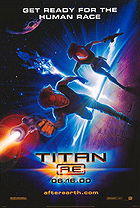 Posted : 11 years, 7 months ago on 6 November 2013 08:43
(A review of Titan A.E.)
Posted : 11 years, 7 months ago on 6 November 2013 08:43
(A review of Titan A.E.)Don Bluth was one of the few animators who worked outside of Disney and had any kind of success with his various projects at different studios. But Bluth was also wildly inconsistent, often delivering films that had more unique parts and parts than they did complete and coherent wholes. Titan A.E. is no different, with a script coming from Ben Edlund, Joss Whedon and John August that somewhere took the best that each of those writers has to offer and shooting out hollow characters, hodgepodge story ideas and cliché beats, from the rest of Bluth’s body of work.
Having said that, while the story and characters are lacking, the visuals are stunning and there are moments of quite clever and unique creature/character/location designs. A thrilling sequence on a battle littered with large balloons filled with explosive gases is marvelous to look at, and the bat/bird hybrid creatures that populate the planet are very strange and original. Another stellar moment comes when the crew runs into a group of space whales, stingray-like animals that seem to leave a trail of stardust in their wake. The combination of CGI and hand-drawn animation throughout the film sometimes works cohesively and other times looks garishly slammed together. This sequence is a moment when the two merge together to create a truly beautiful, breathtaking piece of animation. It’s a pity that the rest of the movie couldn’t rise to the challenge of creating wittier, intelligent things to say or do throughout. But as a cult film, count me firmly in the category of people who think and look back at Titan A.E. with fondness.
Having said that, while the story and characters are lacking, the visuals are stunning and there are moments of quite clever and unique creature/character/location designs. A thrilling sequence on a battle littered with large balloons filled with explosive gases is marvelous to look at, and the bat/bird hybrid creatures that populate the planet are very strange and original. Another stellar moment comes when the crew runs into a group of space whales, stingray-like animals that seem to leave a trail of stardust in their wake. The combination of CGI and hand-drawn animation throughout the film sometimes works cohesively and other times looks garishly slammed together. This sequence is a moment when the two merge together to create a truly beautiful, breathtaking piece of animation. It’s a pity that the rest of the movie couldn’t rise to the challenge of creating wittier, intelligent things to say or do throughout. But as a cult film, count me firmly in the category of people who think and look back at Titan A.E. with fondness.
 0 comments, Reply to this entry
0 comments, Reply to this entry
The Thing
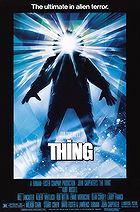 Posted : 11 years, 7 months ago on 6 November 2013 08:43
(A review of The Thing)
Posted : 11 years, 7 months ago on 6 November 2013 08:43
(A review of The Thing)The scariest thing about The Thing isn’t the gore effects or the threat of infection. It’s the escalating sense of paranoia and the confined interiors that forces them to huddle together while stranded out in the wilderness far away from the rest of humanity. There’s no true way to know who is infected and who isn’t, or even how it manages to transfer from one organism to the next.
It helps tremendously that John Carpenter took a detached, remote tone from the material. There isn’t much heat on display, from the icy tundra of the landscape to the clinical approach to the gore and scares, The Thing is a scary movie done expertly. Many of the great special effects scenes in the movie are still highly impressive, but they still manage to disturb and give you a good jump-scare. But it’s the coldness of feeling that allows for the brutality and paranoia of the story to flourish and really ensnare the viewer.
Let’s go back and discuss those practical effects for a few minutes. They are highly disturbing and immensely memorable for just how surreal, deranged and violent they are. The crawling head that sprouts legs and moves around like a spider from hell is something I’ve never seen anything quite like that before, and it is as nightmarish as it sounds. Or the torso that opens up into a giant Venus flytrap and devours someone’s entire forearm? That is frightening stuff which will haunt your dreams for days afterwards. But it’s also incredibly well done; at once grossing you out and making you wonder just how they accomplished that illusion. It’s a bit of a joke and a shame that Rob Bottin and Stan Winston didn’t win the Oscar, or even get a nomination. The Thing had the unfortunate timing of coming a few weeks after E.T. and getting lost in that behemoth.
But it isn’t just purely aesthetics that make the film a success. Much of the credit must go the ensemble, led by a minimalist but terrific Kurt Russell. He manages to project an alpha-male posture that slowly begins to crumble and fade away leaving only the instinct to survive this. The other standouts are Keith David, always a welcome character actor whether it is his great voice work or his actual physical performances, and Wilford Brimley, managing to make a fat middle-aged man with thick glasses the most physically intimidating and chilling character in a room. The rest of the cast does solid work, but they’re not blessed with characters so layered or complex. Their anonymity works in the film’s favor as it makes their eventual demise seem all the more a forgone conclusion.
But when you get right down to it, The Thing is a film about mounting distrust and how men break in the face of an unseen and unknown danger. The greatest fear is the darkness within our souls, and how our paranoia and quest to survive will allow for us to perform and engage in some questionable actions. Film as petri dish to watch the dormant mental and emotional disease within ourselves flourish and destroy everything in its path? No wonder this is now considered a classic.
It helps tremendously that John Carpenter took a detached, remote tone from the material. There isn’t much heat on display, from the icy tundra of the landscape to the clinical approach to the gore and scares, The Thing is a scary movie done expertly. Many of the great special effects scenes in the movie are still highly impressive, but they still manage to disturb and give you a good jump-scare. But it’s the coldness of feeling that allows for the brutality and paranoia of the story to flourish and really ensnare the viewer.
Let’s go back and discuss those practical effects for a few minutes. They are highly disturbing and immensely memorable for just how surreal, deranged and violent they are. The crawling head that sprouts legs and moves around like a spider from hell is something I’ve never seen anything quite like that before, and it is as nightmarish as it sounds. Or the torso that opens up into a giant Venus flytrap and devours someone’s entire forearm? That is frightening stuff which will haunt your dreams for days afterwards. But it’s also incredibly well done; at once grossing you out and making you wonder just how they accomplished that illusion. It’s a bit of a joke and a shame that Rob Bottin and Stan Winston didn’t win the Oscar, or even get a nomination. The Thing had the unfortunate timing of coming a few weeks after E.T. and getting lost in that behemoth.
But it isn’t just purely aesthetics that make the film a success. Much of the credit must go the ensemble, led by a minimalist but terrific Kurt Russell. He manages to project an alpha-male posture that slowly begins to crumble and fade away leaving only the instinct to survive this. The other standouts are Keith David, always a welcome character actor whether it is his great voice work or his actual physical performances, and Wilford Brimley, managing to make a fat middle-aged man with thick glasses the most physically intimidating and chilling character in a room. The rest of the cast does solid work, but they’re not blessed with characters so layered or complex. Their anonymity works in the film’s favor as it makes their eventual demise seem all the more a forgone conclusion.
But when you get right down to it, The Thing is a film about mounting distrust and how men break in the face of an unseen and unknown danger. The greatest fear is the darkness within our souls, and how our paranoia and quest to survive will allow for us to perform and engage in some questionable actions. Film as petri dish to watch the dormant mental and emotional disease within ourselves flourish and destroy everything in its path? No wonder this is now considered a classic.
 0 comments, Reply to this entry
0 comments, Reply to this entry
 Login
Login
 Home
Home 95 Lists
95 Lists 1531 Reviews
1531 Reviews Collections
Collections